Analyzing Misrepresentation: A Contract Law Case Study Solution
VerifiedAdded on 2023/06/03
|6
|1525
|132
Case Study
AI Summary
This case study delves into a scenario involving Peter, a university student, who misrepresented himself to obtain a free textbook copy and subsequently sold it to Joshua. The analysis identifies key legal issues such as pre-contractual misrepresentation, mistake in the subject matter of the contract, and fraud amounting to tort. It examines the contractual relationships between the publisher, Peter, and Joshua, drawing parallels with the King’s Norton Metal Co. v. Edridge case. The study argues that Joshua, as an innocent purchaser, is not obligated to return the book to the publisher. It further explores the remedies available to Joshua against Peter, including rescission of the contract and claiming damages for fraudulent misrepresentation. The study concludes with key takeaways for business professionals, emphasizing the nature of mistakes, the implications of explicit and implied misrepresentation, the importance of addressing delays, and the right to claim compensation for losses incurred due to wrongful activities.
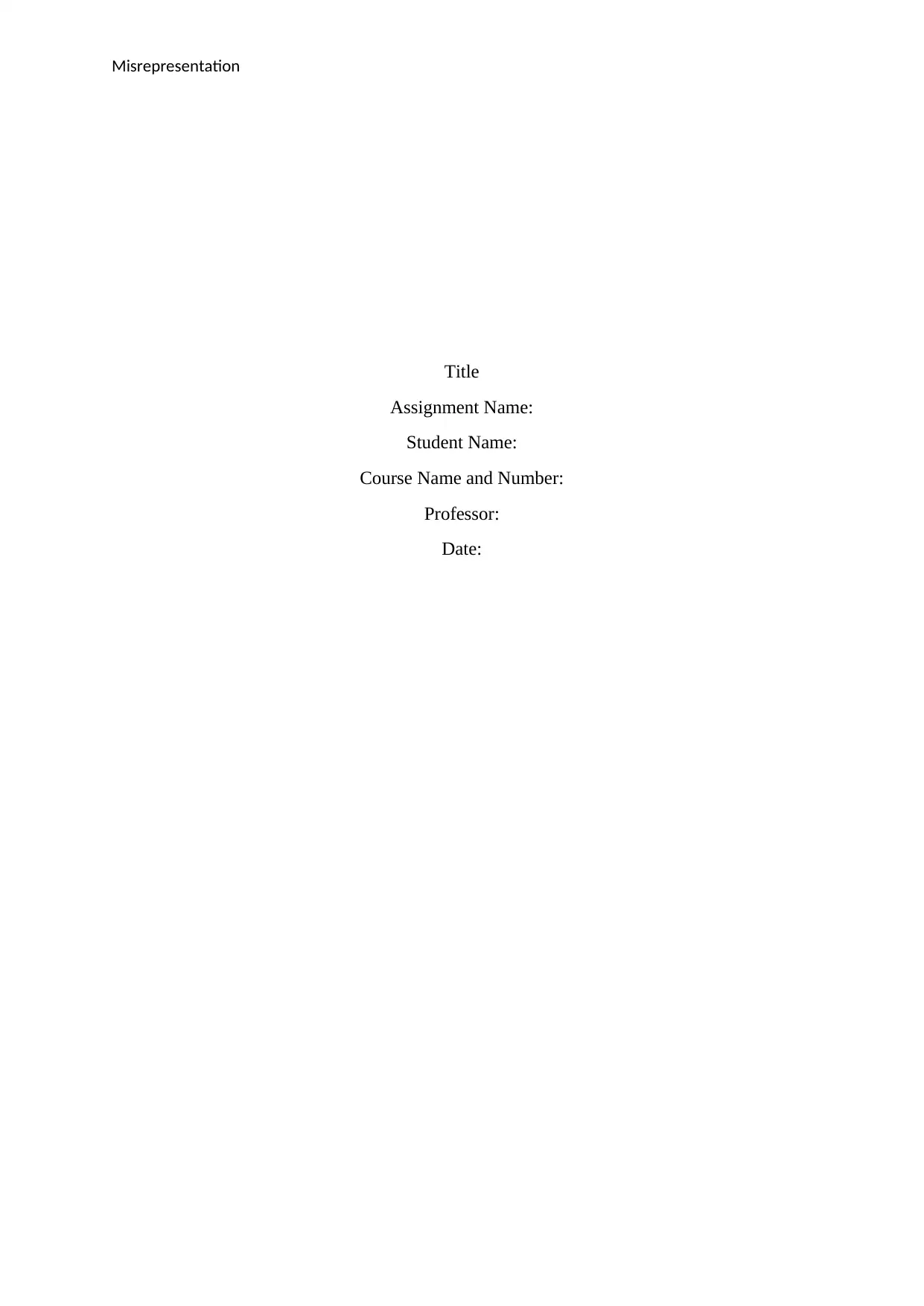
Misrepresentation
Title
Assignment Name:
Student Name:
Course Name and Number:
Professor:
Date:
Title
Assignment Name:
Student Name:
Course Name and Number:
Professor:
Date:
Paraphrase This Document
Need a fresh take? Get an instant paraphrase of this document with our AI Paraphraser
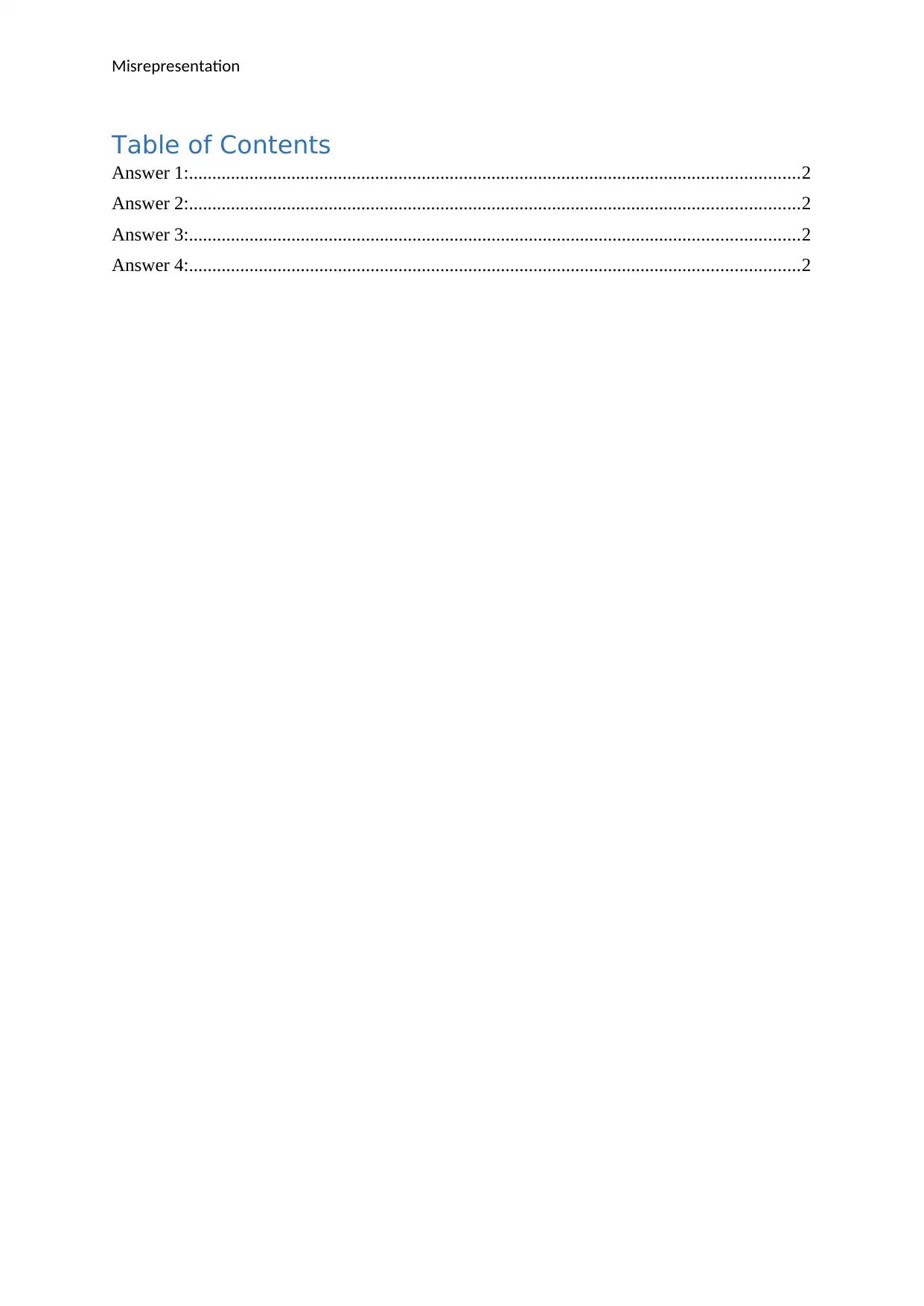
Misrepresentation
Table of Contents
Answer 1:...................................................................................................................................2
Answer 2:...................................................................................................................................2
Answer 3:...................................................................................................................................2
Answer 4:...................................................................................................................................2
Table of Contents
Answer 1:...................................................................................................................................2
Answer 2:...................................................................................................................................2
Answer 3:...................................................................................................................................2
Answer 4:...................................................................................................................................2
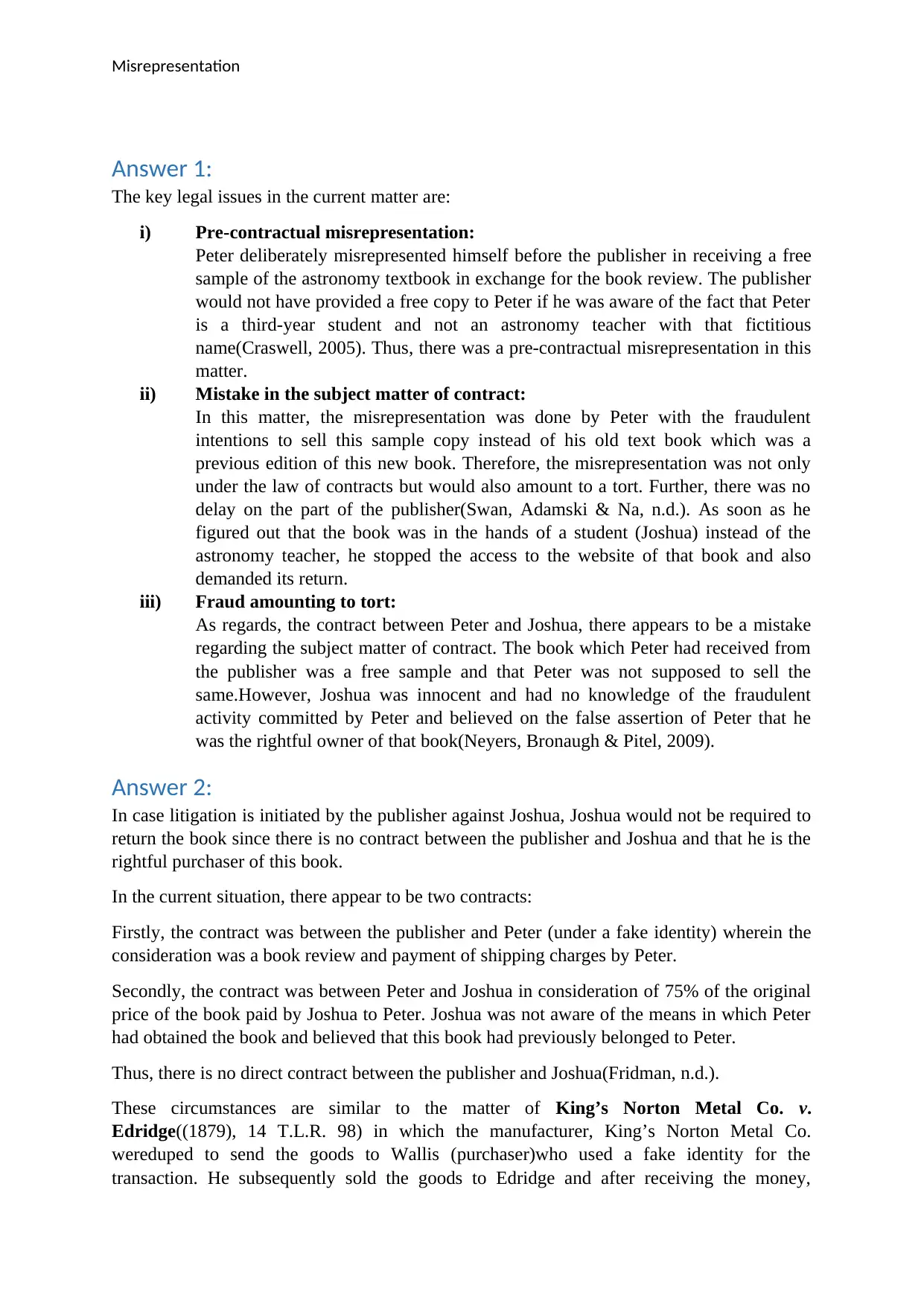
Misrepresentation
Answer 1:
The key legal issues in the current matter are:
i) Pre-contractual misrepresentation:
Peter deliberately misrepresented himself before the publisher in receiving a free
sample of the astronomy textbook in exchange for the book review. The publisher
would not have provided a free copy to Peter if he was aware of the fact that Peter
is a third-year student and not an astronomy teacher with that fictitious
name(Craswell, 2005). Thus, there was a pre-contractual misrepresentation in this
matter.
ii) Mistake in the subject matter of contract:
In this matter, the misrepresentation was done by Peter with the fraudulent
intentions to sell this sample copy instead of his old text book which was a
previous edition of this new book. Therefore, the misrepresentation was not only
under the law of contracts but would also amount to a tort. Further, there was no
delay on the part of the publisher(Swan, Adamski & Na, n.d.). As soon as he
figured out that the book was in the hands of a student (Joshua) instead of the
astronomy teacher, he stopped the access to the website of that book and also
demanded its return.
iii) Fraud amounting to tort:
As regards, the contract between Peter and Joshua, there appears to be a mistake
regarding the subject matter of contract. The book which Peter had received from
the publisher was a free sample and that Peter was not supposed to sell the
same.However, Joshua was innocent and had no knowledge of the fraudulent
activity committed by Peter and believed on the false assertion of Peter that he
was the rightful owner of that book(Neyers, Bronaugh & Pitel, 2009).
Answer 2:
In case litigation is initiated by the publisher against Joshua, Joshua would not be required to
return the book since there is no contract between the publisher and Joshua and that he is the
rightful purchaser of this book.
In the current situation, there appear to be two contracts:
Firstly, the contract was between the publisher and Peter (under a fake identity) wherein the
consideration was a book review and payment of shipping charges by Peter.
Secondly, the contract was between Peter and Joshua in consideration of 75% of the original
price of the book paid by Joshua to Peter. Joshua was not aware of the means in which Peter
had obtained the book and believed that this book had previously belonged to Peter.
Thus, there is no direct contract between the publisher and Joshua(Fridman, n.d.).
These circumstances are similar to the matter of King’s Norton Metal Co. v.
Edridge((1879), 14 T.L.R. 98) in which the manufacturer, King’s Norton Metal Co.
wereduped to send the goods to Wallis (purchaser)who used a fake identity for the
transaction. He subsequently sold the goods to Edridge and after receiving the money,
Answer 1:
The key legal issues in the current matter are:
i) Pre-contractual misrepresentation:
Peter deliberately misrepresented himself before the publisher in receiving a free
sample of the astronomy textbook in exchange for the book review. The publisher
would not have provided a free copy to Peter if he was aware of the fact that Peter
is a third-year student and not an astronomy teacher with that fictitious
name(Craswell, 2005). Thus, there was a pre-contractual misrepresentation in this
matter.
ii) Mistake in the subject matter of contract:
In this matter, the misrepresentation was done by Peter with the fraudulent
intentions to sell this sample copy instead of his old text book which was a
previous edition of this new book. Therefore, the misrepresentation was not only
under the law of contracts but would also amount to a tort. Further, there was no
delay on the part of the publisher(Swan, Adamski & Na, n.d.). As soon as he
figured out that the book was in the hands of a student (Joshua) instead of the
astronomy teacher, he stopped the access to the website of that book and also
demanded its return.
iii) Fraud amounting to tort:
As regards, the contract between Peter and Joshua, there appears to be a mistake
regarding the subject matter of contract. The book which Peter had received from
the publisher was a free sample and that Peter was not supposed to sell the
same.However, Joshua was innocent and had no knowledge of the fraudulent
activity committed by Peter and believed on the false assertion of Peter that he
was the rightful owner of that book(Neyers, Bronaugh & Pitel, 2009).
Answer 2:
In case litigation is initiated by the publisher against Joshua, Joshua would not be required to
return the book since there is no contract between the publisher and Joshua and that he is the
rightful purchaser of this book.
In the current situation, there appear to be two contracts:
Firstly, the contract was between the publisher and Peter (under a fake identity) wherein the
consideration was a book review and payment of shipping charges by Peter.
Secondly, the contract was between Peter and Joshua in consideration of 75% of the original
price of the book paid by Joshua to Peter. Joshua was not aware of the means in which Peter
had obtained the book and believed that this book had previously belonged to Peter.
Thus, there is no direct contract between the publisher and Joshua(Fridman, n.d.).
These circumstances are similar to the matter of King’s Norton Metal Co. v.
Edridge((1879), 14 T.L.R. 98) in which the manufacturer, King’s Norton Metal Co.
wereduped to send the goods to Wallis (purchaser)who used a fake identity for the
transaction. He subsequently sold the goods to Edridge and after receiving the money,
⊘ This is a preview!⊘
Do you want full access?
Subscribe today to unlock all pages.

Trusted by 1+ million students worldwide
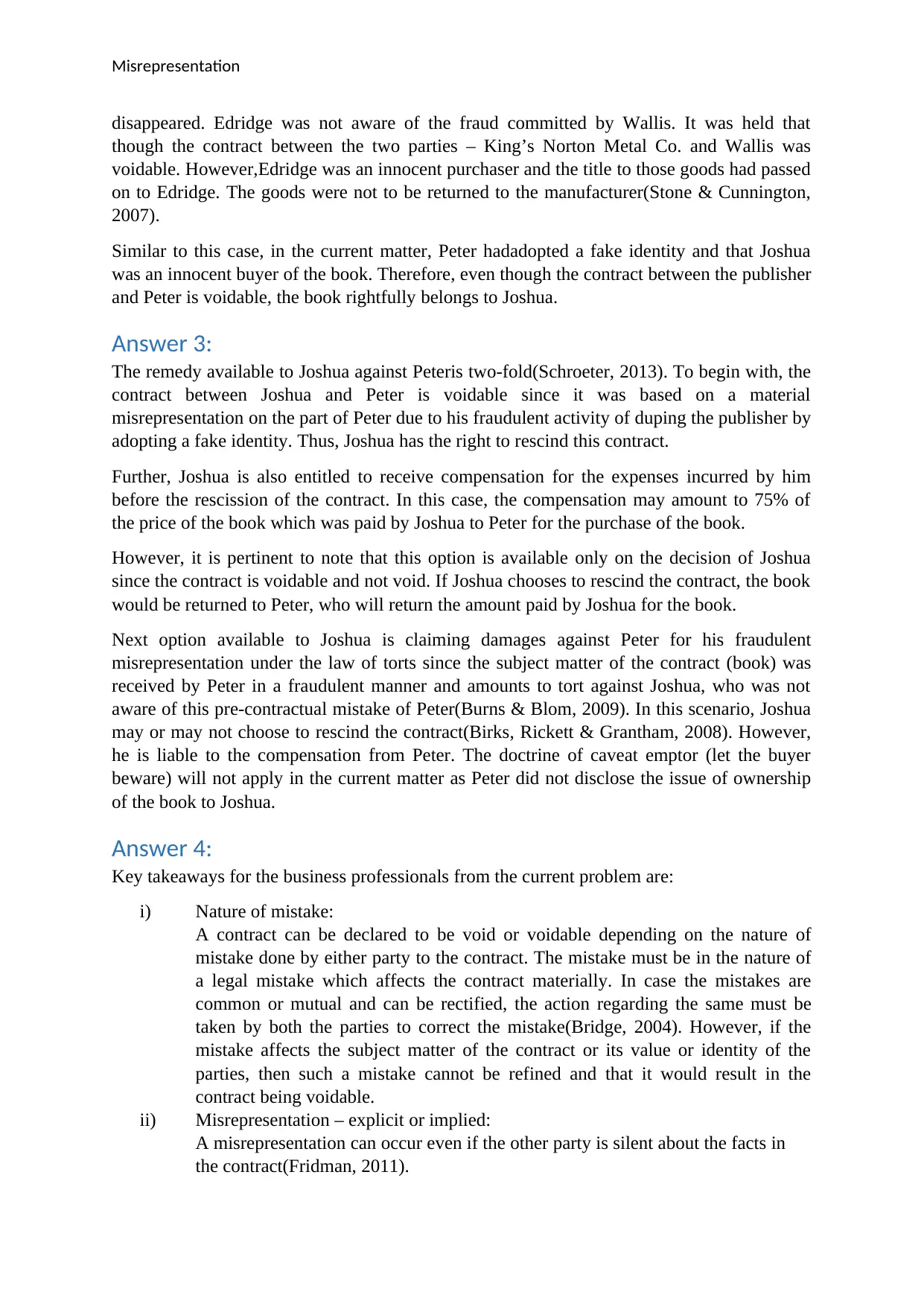
Misrepresentation
disappeared. Edridge was not aware of the fraud committed by Wallis. It was held that
though the contract between the two parties – King’s Norton Metal Co. and Wallis was
voidable. However,Edridge was an innocent purchaser and the title to those goods had passed
on to Edridge. The goods were not to be returned to the manufacturer(Stone & Cunnington,
2007).
Similar to this case, in the current matter, Peter hadadopted a fake identity and that Joshua
was an innocent buyer of the book. Therefore, even though the contract between the publisher
and Peter is voidable, the book rightfully belongs to Joshua.
Answer 3:
The remedy available to Joshua against Peteris two-fold(Schroeter, 2013). To begin with, the
contract between Joshua and Peter is voidable since it was based on a material
misrepresentation on the part of Peter due to his fraudulent activity of duping the publisher by
adopting a fake identity. Thus, Joshua has the right to rescind this contract.
Further, Joshua is also entitled to receive compensation for the expenses incurred by him
before the rescission of the contract. In this case, the compensation may amount to 75% of
the price of the book which was paid by Joshua to Peter for the purchase of the book.
However, it is pertinent to note that this option is available only on the decision of Joshua
since the contract is voidable and not void. If Joshua chooses to rescind the contract, the book
would be returned to Peter, who will return the amount paid by Joshua for the book.
Next option available to Joshua is claiming damages against Peter for his fraudulent
misrepresentation under the law of torts since the subject matter of the contract (book) was
received by Peter in a fraudulent manner and amounts to tort against Joshua, who was not
aware of this pre-contractual mistake of Peter(Burns & Blom, 2009). In this scenario, Joshua
may or may not choose to rescind the contract(Birks, Rickett & Grantham, 2008). However,
he is liable to the compensation from Peter. The doctrine of caveat emptor (let the buyer
beware) will not apply in the current matter as Peter did not disclose the issue of ownership
of the book to Joshua.
Answer 4:
Key takeaways for the business professionals from the current problem are:
i) Nature of mistake:
A contract can be declared to be void or voidable depending on the nature of
mistake done by either party to the contract. The mistake must be in the nature of
a legal mistake which affects the contract materially. In case the mistakes are
common or mutual and can be rectified, the action regarding the same must be
taken by both the parties to correct the mistake(Bridge, 2004). However, if the
mistake affects the subject matter of the contract or its value or identity of the
parties, then such a mistake cannot be refined and that it would result in the
contract being voidable.
ii) Misrepresentation – explicit or implied:
A misrepresentation can occur even if the other party is silent about the facts in
the contract(Fridman, 2011).
disappeared. Edridge was not aware of the fraud committed by Wallis. It was held that
though the contract between the two parties – King’s Norton Metal Co. and Wallis was
voidable. However,Edridge was an innocent purchaser and the title to those goods had passed
on to Edridge. The goods were not to be returned to the manufacturer(Stone & Cunnington,
2007).
Similar to this case, in the current matter, Peter hadadopted a fake identity and that Joshua
was an innocent buyer of the book. Therefore, even though the contract between the publisher
and Peter is voidable, the book rightfully belongs to Joshua.
Answer 3:
The remedy available to Joshua against Peteris two-fold(Schroeter, 2013). To begin with, the
contract between Joshua and Peter is voidable since it was based on a material
misrepresentation on the part of Peter due to his fraudulent activity of duping the publisher by
adopting a fake identity. Thus, Joshua has the right to rescind this contract.
Further, Joshua is also entitled to receive compensation for the expenses incurred by him
before the rescission of the contract. In this case, the compensation may amount to 75% of
the price of the book which was paid by Joshua to Peter for the purchase of the book.
However, it is pertinent to note that this option is available only on the decision of Joshua
since the contract is voidable and not void. If Joshua chooses to rescind the contract, the book
would be returned to Peter, who will return the amount paid by Joshua for the book.
Next option available to Joshua is claiming damages against Peter for his fraudulent
misrepresentation under the law of torts since the subject matter of the contract (book) was
received by Peter in a fraudulent manner and amounts to tort against Joshua, who was not
aware of this pre-contractual mistake of Peter(Burns & Blom, 2009). In this scenario, Joshua
may or may not choose to rescind the contract(Birks, Rickett & Grantham, 2008). However,
he is liable to the compensation from Peter. The doctrine of caveat emptor (let the buyer
beware) will not apply in the current matter as Peter did not disclose the issue of ownership
of the book to Joshua.
Answer 4:
Key takeaways for the business professionals from the current problem are:
i) Nature of mistake:
A contract can be declared to be void or voidable depending on the nature of
mistake done by either party to the contract. The mistake must be in the nature of
a legal mistake which affects the contract materially. In case the mistakes are
common or mutual and can be rectified, the action regarding the same must be
taken by both the parties to correct the mistake(Bridge, 2004). However, if the
mistake affects the subject matter of the contract or its value or identity of the
parties, then such a mistake cannot be refined and that it would result in the
contract being voidable.
ii) Misrepresentation – explicit or implied:
A misrepresentation can occur even if the other party is silent about the facts in
the contract(Fridman, 2011).
Paraphrase This Document
Need a fresh take? Get an instant paraphrase of this document with our AI Paraphraser
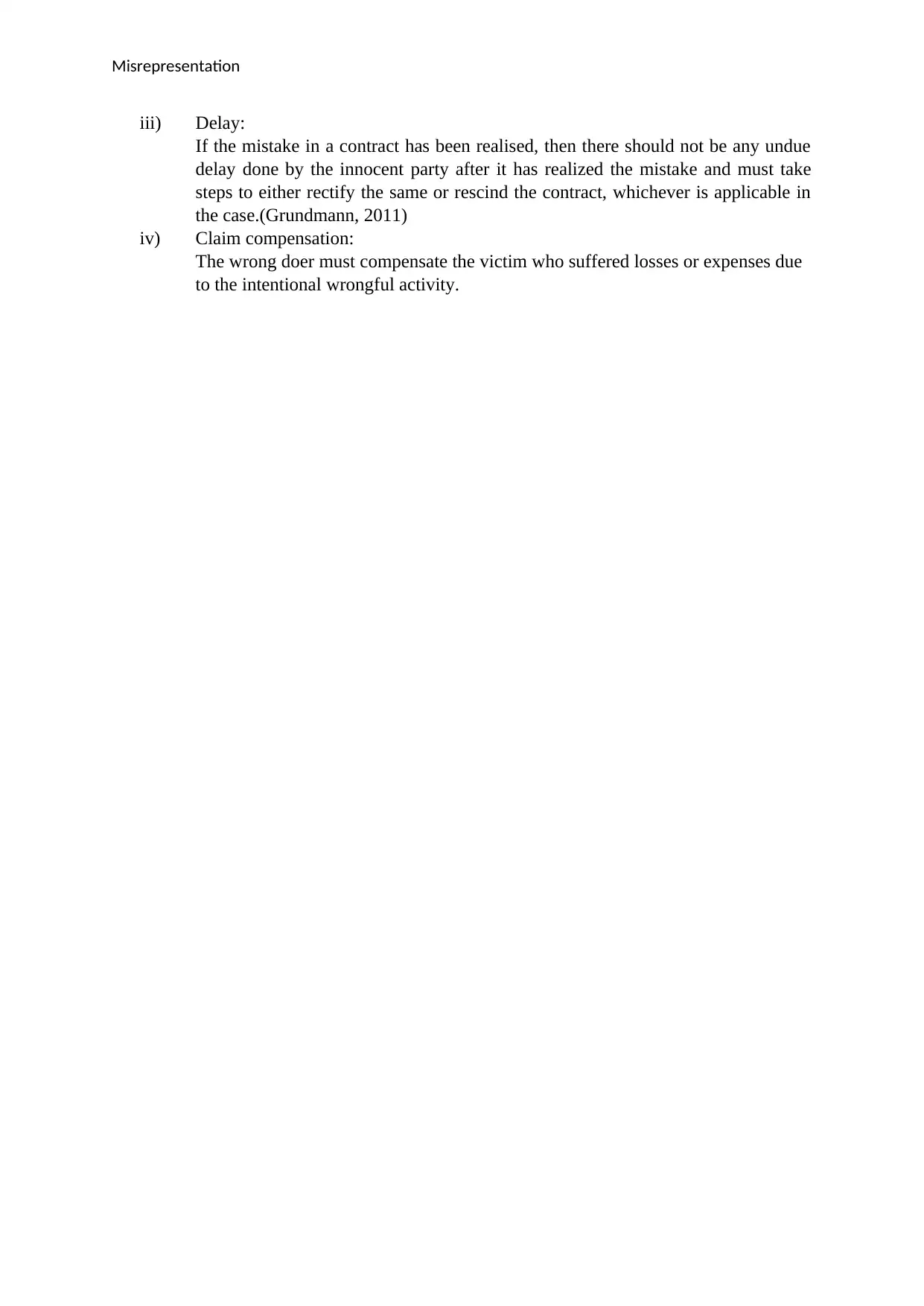
Misrepresentation
iii) Delay:
If the mistake in a contract has been realised, then there should not be any undue
delay done by the innocent party after it has realized the mistake and must take
steps to either rectify the same or rescind the contract, whichever is applicable in
the case.(Grundmann, 2011)
iv) Claim compensation:
The wrong doer must compensate the victim who suffered losses or expenses due
to the intentional wrongful activity.
iii) Delay:
If the mistake in a contract has been realised, then there should not be any undue
delay done by the innocent party after it has realized the mistake and must take
steps to either rectify the same or rescind the contract, whichever is applicable in
the case.(Grundmann, 2011)
iv) Claim compensation:
The wrong doer must compensate the victim who suffered losses or expenses due
to the intentional wrongful activity.
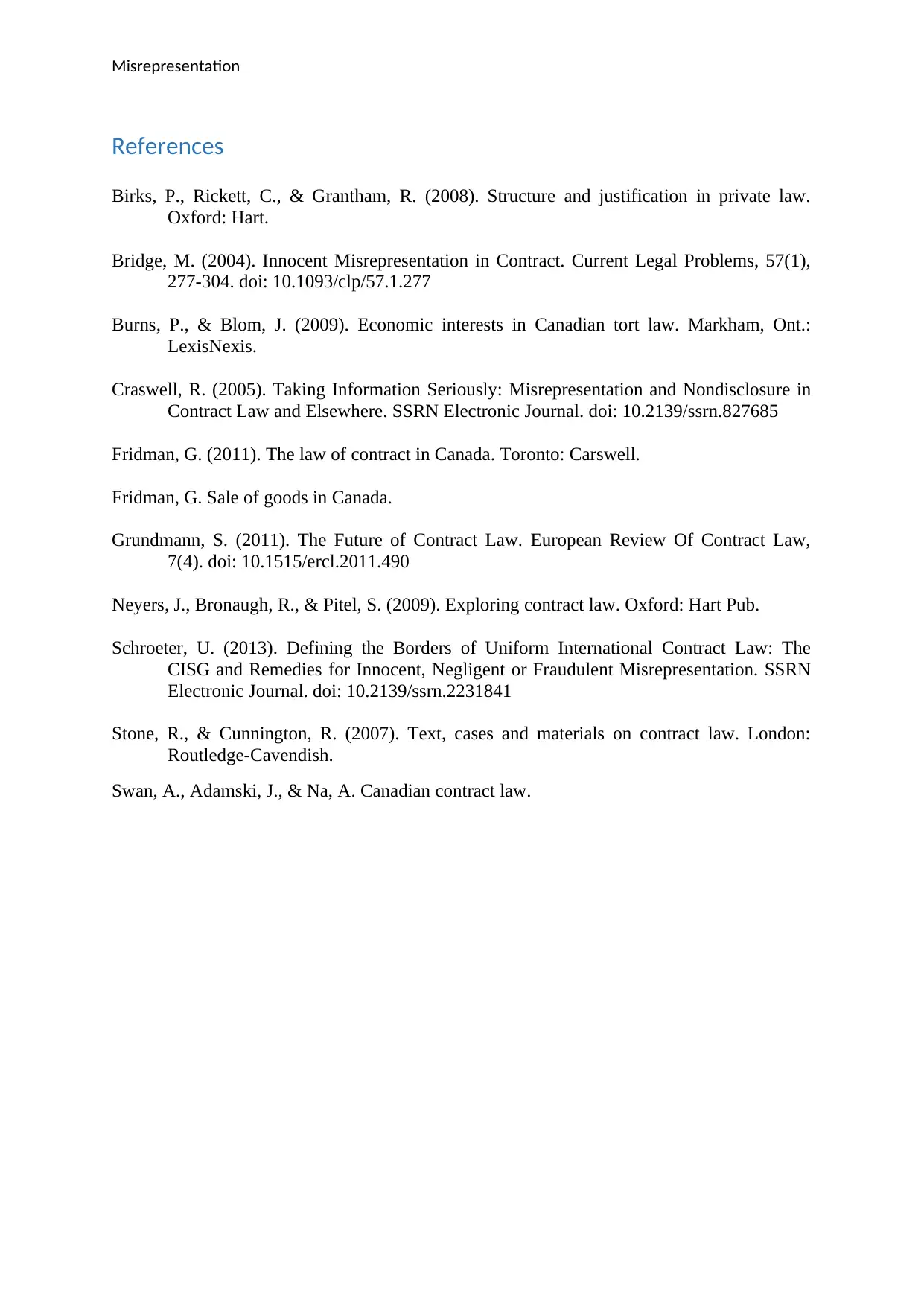
Misrepresentation
References
Birks, P., Rickett, C., & Grantham, R. (2008). Structure and justification in private law.
Oxford: Hart.
Bridge, M. (2004). Innocent Misrepresentation in Contract. Current Legal Problems, 57(1),
277-304. doi: 10.1093/clp/57.1.277
Burns, P., & Blom, J. (2009). Economic interests in Canadian tort law. Markham, Ont.:
LexisNexis.
Craswell, R. (2005). Taking Information Seriously: Misrepresentation and Nondisclosure in
Contract Law and Elsewhere. SSRN Electronic Journal. doi: 10.2139/ssrn.827685
Fridman, G. (2011). The law of contract in Canada. Toronto: Carswell.
Fridman, G. Sale of goods in Canada.
Grundmann, S. (2011). The Future of Contract Law. European Review Of Contract Law,
7(4). doi: 10.1515/ercl.2011.490
Neyers, J., Bronaugh, R., & Pitel, S. (2009). Exploring contract law. Oxford: Hart Pub.
Schroeter, U. (2013). Defining the Borders of Uniform International Contract Law: The
CISG and Remedies for Innocent, Negligent or Fraudulent Misrepresentation. SSRN
Electronic Journal. doi: 10.2139/ssrn.2231841
Stone, R., & Cunnington, R. (2007). Text, cases and materials on contract law. London:
Routledge-Cavendish.
Swan, A., Adamski, J., & Na, A. Canadian contract law.
References
Birks, P., Rickett, C., & Grantham, R. (2008). Structure and justification in private law.
Oxford: Hart.
Bridge, M. (2004). Innocent Misrepresentation in Contract. Current Legal Problems, 57(1),
277-304. doi: 10.1093/clp/57.1.277
Burns, P., & Blom, J. (2009). Economic interests in Canadian tort law. Markham, Ont.:
LexisNexis.
Craswell, R. (2005). Taking Information Seriously: Misrepresentation and Nondisclosure in
Contract Law and Elsewhere. SSRN Electronic Journal. doi: 10.2139/ssrn.827685
Fridman, G. (2011). The law of contract in Canada. Toronto: Carswell.
Fridman, G. Sale of goods in Canada.
Grundmann, S. (2011). The Future of Contract Law. European Review Of Contract Law,
7(4). doi: 10.1515/ercl.2011.490
Neyers, J., Bronaugh, R., & Pitel, S. (2009). Exploring contract law. Oxford: Hart Pub.
Schroeter, U. (2013). Defining the Borders of Uniform International Contract Law: The
CISG and Remedies for Innocent, Negligent or Fraudulent Misrepresentation. SSRN
Electronic Journal. doi: 10.2139/ssrn.2231841
Stone, R., & Cunnington, R. (2007). Text, cases and materials on contract law. London:
Routledge-Cavendish.
Swan, A., Adamski, J., & Na, A. Canadian contract law.
⊘ This is a preview!⊘
Do you want full access?
Subscribe today to unlock all pages.

Trusted by 1+ million students worldwide
1 out of 6
Your All-in-One AI-Powered Toolkit for Academic Success.
+13062052269
info@desklib.com
Available 24*7 on WhatsApp / Email
![[object Object]](/_next/static/media/star-bottom.7253800d.svg)
Unlock your academic potential
Copyright © 2020–2025 A2Z Services. All Rights Reserved. Developed and managed by ZUCOL.